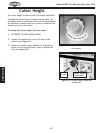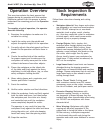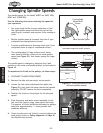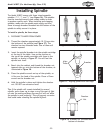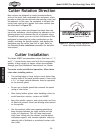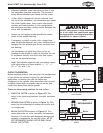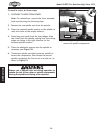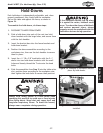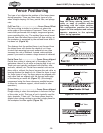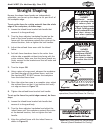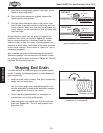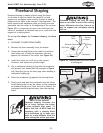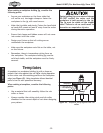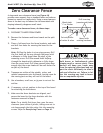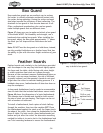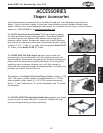
-28-
Df[\cN(/).=fiDXZ_`e\jD]^%J`eZ\*&()
FG<I8K@FEJ
=\eZ\Gfj`k`fe`e^
The type of cut dictates the position of the fence pieces
during operation. There are three basic types of cuts
when straight shaping—full face, partial face, and plunge
cuts.
=lcc=XZ\:lk%%%%%%%%%%%%%%%%%%%%%%%%%%%%=\eZ\G`\Z\jF]]j\k
Full face cutting is similar to a jointer cut where the
entire edge of the workpiece is removed. These cuts are
most often performed with straight, tongue-and-groove,
crown moulding bits, etc. The outfeed fence must be set
forward from the infeed fence when full face cutting, so
the workpiece is supported by the outfeed fence after it
has been cut (=`^li\*-).
The distance that the outfeed fence is set forward from
the infeed fence will dictate the depth of cut. Keep
in mind that removing too much material at one time
increases the risk of kickback. Instead, make multiple
passes if you need to remove a large amount of material.
GXik`Xc=XZ\:lk%%%%%%%%%%%%%%%%%%%%%%=\eZ\G`\Z\j8c`^e\[
Partial face cutting is where part of the edge of the
workpiece rides on a rub collar or bearing and is not cut.
These cuts are typically performed with profiles, stile-
and-rails, rabbets, etc. Partial face removal cuts can be
done with or without the fence, because the rub collar or
bearing dictates the depth of cut. When the fence is used
for these types of cuts, the fence pieces are aligned with
each other and are aligned with the forward most edge
of the bearing or router bit (=`^li\*.). (We strongly
recommend using the fence whenever possible because
it allows for maximum support, which results in safer
operation.)
Gcle^\:lkj%%%%%%%%%%%%%%%%%%%%%%%%%%%%=\eZ\G`\Z\j8c`^e\[
Plunge cutting is when the workpiece is fed over the top
of the cutter or bit. This type of cut is typically used for
slots, dovetails, T-slots, etc. The fence pieces must be
aligned when plunge cutting to provide a single plane for
the workpiece to slide against (=`^li\*/).
<e[M`\n
=`^li\*-% Full face cut.
<e[M`\n
=`^li\*.% Partial face cut.
<e[M`\n
;`i\Zk`fef]:lk
=`^li\*/% Plunge cut.
B\\g k_\ ]\eZ\ fg\e`e^ Xifle[ k_\
Zlkk\i Xj jdXcc Xj gfjj`Yc\ n`k_flk
`ek\i]\i`e^ n`k_ k_\ Zlkk\i ifkXk`fe%
K_`j Zfe]`^liXk`fe gifm`[\j k_\ Y\jk
jlggfik]fik_\nfibg`\Z\Xe[i\[lZ\j
fg\iXkfi \ogfjli\ kf k_\ jg`ee`e^
Zlkk\i[li`e^fg\iXk`fe%



